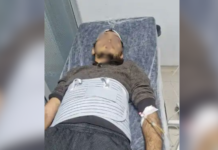The Turkish government detained at least 33 people on Thursday morning across Turkey as part of its massive post-coup witch hunt targeting alleged members of the Gülen movement following the issuance of detention warrants for 77 people over their alleged use of the ByLock mobile phone messaging application.
Turkish authorities believe ByLock is a communication tool among alleged followers of the Gülen movement. Tens of thousands of people, including civil servants, police officers, soldiers, businessmen and even housewives, have either been dismissed or arrested for using ByLock since a controversial coup attempt on July 15, 2016.
According to a report by Turkey’s state-run Anadolu news agency, 19 of the 33 detainees were taken into custody by police in 22 provinces including İstanbul after the İstanbul Chief Public Prosecutor’s Office issued warrants for 57 people, all accused of using ByLock. The report said eight of those wanted are abroad.
In separate probe in eight provinces including Balıkesir in Turkey’s west, at least 14 people were detained after the Balıkesir Chief Public Prosecutor’s Office issued detention warrants for 20 people, who are also accused of using ByLock. Police are reportedly searching for the other six people.
Meanwhile, a court in İzmir on Wednesday overturned the acquittal of five suspects for their alleged role in an alleged plot to assassinate Turkish President Recep Tayyip Erdoğan during the night of the coup attempt.
The 2nd penal department of a regional court in the western province of İzmir reheard the case of 42 military members who had been tried by a court in Muğla, southwestern Turkey, on Oct. 4, 2017, on charges of attempting to assassinate Erdoğan as part of the coup bid.
The defendants include former Brig. Gen. Gökhan Şahin Sönmezateş, former Maj. Sükrü Seymen and former Master Sgt. Zekeriya Kuzu. The court had also sentenced Ali Yazıcı, Erdoğan’s former military aide, to 18 years in prison.
The penal court in İzmir upheld the previous decision for 37 military officers and quashed the acquittals of five people including Haydar Murat Özden, Ahmet Koçan, Cenk Bahadır Avcı, Aydın Özsıcak and Murat Gösterit. Özden, Kocan, Avcı, Özsıcak and Gösterit were each given two aggravated life sentences over allegedly attempting to assassinate the president.
The defendants also got 15 years each for alleged attempted murder, 15 years for deprivation of liberty and five years for deliberately causing bodily injury.
Turkey survived a controversial military coup attempt on July 15, 2016 that killed 249 people. Immediately after the putsch, the Justice and Development Party (AKP) government along with President Recep Tayyip Erdoğan pinned the blame on the Gülen movement.
Fethullah Gülen, who inspired the movement, strongly denied having any role in the failed coup and called for an international investigation into it, but President Erdoğan — calling the coup attempt “a gift from God” — and the government initiated a widespread purge aimed at cleansing sympathizers of the movement from within state institutions, dehumanizing its popular figures and putting them in custody.
Turkey has suspended or dismissed more than 150,000 judges, teachers, police and civil servants since July 15. On December 13, 2017 the Justice Ministry announced that 169,013 people have been the subject of legal proceedings on coup charges since the failed coup.
Turkish Interior Minister Süleyman Soylu announced on April 18, 2018 that the Turkish government had jailed 77,081 people between July 15, 2016 and April 11, 2018 over alleged links to the Gülen movement.







![[UPDATE] French journalist detained in İstanbul during protests released](https://stockholmcf.org/wp-content/uploads/2026/01/raphael_boukandra-218x150.jpg)







